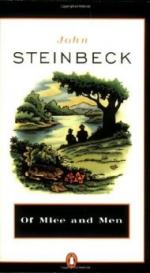|
|
Of Mice and Men Topic Tracking: Dreams
Dreams 1: A little bit of land, their own crops and animals-this is all they want. It is a simple American dream. They want to be self-reliant:
"'Well,' said George, 'we'll have a big vegetable patch and a rabbit hutch and chickens. And when it rains in the winter, we'll just say the hell with goin' to work, and we'll build up a fire in the stove and set around it an' listen to the rain comin' down on the roof...'" Chapter 1, pg. 14-15.
Their perfect world is one of independence. Workers like Lennie and George have no family, no home, and very little control over their lives. They have to do what the boss tells them and they have little to show for it. They only own what they can carry. Therefore, this idea of having such power over their lives is a strong motivation.
Dreams 2: When Whit brings in the pulp magazine with the letter written by Bill Tenner, the men are all very impressed. They are not certain that Bill wrote the letter, but Whit is convinced he did, and tries to convince the others. In the transient life of these workers, it is rare to leave any kind of permanent mark on the world. In this letter Bill Tenner has achieved some of the immortality the other men cannot imagine for themselves.
Dreams 3: When George goes into a full description of the farm, its Eden-like qualities become even more apparent. All the food they want will be right there, with minimal effort. As Lennie says:
"We could live offa the fatta the lan'." Chapter 3, pg. 57.
When George talks about their farm, he twice describes it in terms of things he loved in childhood:
"I could build a smoke house like the one gran'pa had..." Chapter 3, pg. 57.
"An' we'd keep a few pigeons to go flyin' around the win'mill like they done when I was a kid." Chapter 3, pg. 58.
George yearns for his future to reflect the beauty of his childhood.
Dreams 4: The ideal world presented by Crooks also reflects childhood. His father had a chicken ranch full of white chickens, a berry patch, and alfalfa. He and his brothers would sit and watch the chickens. Companionship and plentiful food are both parts of Crooks' dream.
Dreams 5: Curley's wife has a dream that although different in detail from the other's dreams, is still very similar in its general desires. She wants companionship so much that she will try to talk to people who don't want to talk to her, like all the men on the ranch. Unsatisfied by her surly husband, she constantly lurks around the barn, trying to engage the workers in conversation.
The second part of her dream parallels the men's desire for their own land. She wanted to be an actress in Hollywood. She imagines how great it would be to stay in nice hotels, own lots of beautiful clothes, and have people want to take her photograph. Both attention and financial security would have been hers. Like the men she desires friendship, and also material comforts, though the specifics of her dream differ from theirs.
Dreams 6: When George tells Lennie to look across the river and imagine their farm, he lets Lennie die with the hope that they will attain their dream, and attain it soon. George, who must kill Lennie, is not allowed such comfort. He must go on living knowing the failure of their dream, as well as deal with the guilt of having killed his best friend.




